The Broadway National Tour of Charlie And The Chocolate Factory scores points for its colorful performances and sets (and for its singing-dancing Oompa Loompas), but audiences looking for characters they can care about, a plot that will maintain their interest, and songs they’ll want to hear more than once won’t find them at the Segerstrom Center For The Arts.
 Whatever worked in Roald Dahl’s 1966 novel or its 1971 movie adaptation, very little works in Charlie And The Chocolate Factory as directed for Broadway by Jack O’Brien with book by David Grieg and featuring mostly forgettable new songs by the usually reliable Marc Shaiman and Scott Wittman.
Whatever worked in Roald Dahl’s 1966 novel or its 1971 movie adaptation, very little works in Charlie And The Chocolate Factory as directed for Broadway by Jack O’Brien with book by David Grieg and featuring mostly forgettable new songs by the usually reliable Marc Shaiman and Scott Wittman.
Not to say that there aren’t exceptions to Charlie And the Chocolate Factory’s deadly dullness, most significantly the captivating title-role performance by Opening Night child star Henry Boshart.
 Like Matilda Wormwood on Broadway before him, Boshart’s Charlie Bucket has grown up in the most dire of circumstances, though unlike the comfortably off but unappreciated and unloved Matilda, Charlie at least has a caring mother (Amanda Rose as Mrs. Bucket) and four bed-sharing grandparents (Benjamin Howes, Jennifer Jill Malenke, Claire Newmann, and most significantly James Young’s Grandpa Joe) who love him.
Like Matilda Wormwood on Broadway before him, Boshart’s Charlie Bucket has grown up in the most dire of circumstances, though unlike the comfortably off but unappreciated and unloved Matilda, Charlie at least has a caring mother (Amanda Rose as Mrs. Bucket) and four bed-sharing grandparents (Benjamin Howes, Jennifer Jill Malenke, Claire Newmann, and most significantly James Young’s Grandpa Joe) who love him.
Unfortunately for our hapless young hero, the Buckets find themselves living in such abject poverty that the only food they can afford to buy are rotting veggies from sassy street vendor Mrs. Green (Clyde Voce).
 No wonder then that when the local Candy Man (Noah Weisberg as Willy Wonka in disguise) informs chocolate-loving Charlie that both a factory tour and a lifetime supply of Wonka chocolate will be awarded the purchasers of Wonka Bars containing “Golden Tickets,” young Master Bucket vows to be one of the lucky five winners.
No wonder then that when the local Candy Man (Noah Weisberg as Willy Wonka in disguise) informs chocolate-loving Charlie that both a factory tour and a lifetime supply of Wonka chocolate will be awarded the purchasers of Wonka Bars containing “Golden Tickets,” young Master Bucket vows to be one of the lucky five winners.
It doesn’t take a rocket scientist to predict that Charlie’s wish will eventually come true, eventually being the key word, because Charlie And The Chocolate Factory spends almost its entire first act simply introducing the four other winners.
Ten-ton Teutonic terror Augustus Gloop (Matt Wood) is the first to score a Golden Ticket, news that excites the obese youngster almost as much as the sausages he and his mother Mrs. Gloop (Kathy Fitzgerald) wear round their necks for easy, immediate access to their snack of choice.
Loud-mouthed Russian ballerina Veruca Salt (Jessica Cohen) and her bombastic father Mr. Salt (Nathaniel Hackmann) are next to score, followed by obnoxious, bubble-gum-loving Disney-style idol singer Violet Beauregard (Brynn Williams) and her dad Mr. Beauregard (David Samuel), and finally cellphone-addicted hip-hopper Mike Teavee (Daniel Quadrino) and his mom Mrs. Teavee (Madeleine Doherty).
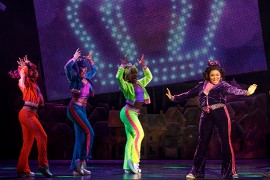 Each of Charlie’s fellow winners gets two musical numbers each, first when introduced by Nightly News anchor Jerry (Joel Newsome) and reporter Cherry (swing Karen Hyland), and later in Act Two when each meets his or her maker in the most grotesque (albeit amusing) of ways.
Each of Charlie’s fellow winners gets two musical numbers each, first when introduced by Nightly News anchor Jerry (Joel Newsome) and reporter Cherry (swing Karen Hyland), and later in Act Two when each meets his or her maker in the most grotesque (albeit amusing) of ways.
If only even one of these Shaiman-Wittman ditties were even the slightest bit memorable.
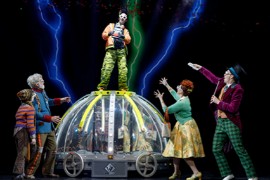 They’re not, leaving only the musical’s two recognizable hits (the Leslie Bricusse-Anthony Newley movie classics “The Candy Man” and “Pure Imagination”) to remind audiences what a catchy tune is, though Shaiman and Wittman’s show-closing “The View From Here” comes close.
They’re not, leaving only the musical’s two recognizable hits (the Leslie Bricusse-Anthony Newley movie classics “The Candy Man” and “Pure Imagination”) to remind audiences what a catchy tune is, though Shaiman and Wittman’s show-closing “The View From Here” comes close.
Having leading man Weisman play both the real Willy Wonka and his incognito self increases the stage time Willy got in Charlie And The Chocolate Factory’s West End debut, but Candy Man is so dour, playing him does the otherwise absolutely splendid Weisman no favors.
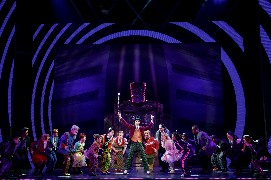 Americanizing Dahl’s English characters may make Willy, Charlie, and the rest easier to understand than the Brits in Matilda The Musical, but the nationality switch only adds to Charlie And The Chocolate Factory’s absence of charm.
Americanizing Dahl’s English characters may make Willy, Charlie, and the rest easier to understand than the Brits in Matilda The Musical, but the nationality switch only adds to Charlie And The Chocolate Factory’s absence of charm.
Finally, while having Charlie’s fellow winners played by adults does allow for more outrageously over-the-top characterizations (not necessarily a minus), I can’t help wondering how much more engaging the musical would be if like Matilda and School Of Rock (and in the West End original), the creative team had trusted age-appropriate triple-threats in the roles.
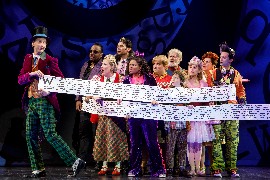 I certainly can’t fault the talent of all those mentioned above, with special snaps to Cohen’s balletically-gifted Veruca, Quadrino’s acrobatically-adept Mike, Doherty’s hilariously trapped-in-the-‘50s Mrs. Teavee, and Young and Rose’s Grandpa and Mrs. Green, who along with Boshart’s Charlie give the show the little bit of heart it has.
I certainly can’t fault the talent of all those mentioned above, with special snaps to Cohen’s balletically-gifted Veruca, Quadrino’s acrobatically-adept Mike, Doherty’s hilariously trapped-in-the-‘50s Mrs. Teavee, and Young and Rose’s Grandpa and Mrs. Green, who along with Boshart’s Charlie give the show the little bit of heart it has.
One thing that definitely does work are the Oompa Loompas, pintsized chocolate makers manipulated by Alex Dreschke, Jess Fry, David R. Gordon, Chavon Hampton, Lily Kaufmann, David Paul Kidder, Tanisha Moore, Caylie Rose Newcome, Borris Anthony York, and other ensemble members in an ingenious, must-be-seen-to-be-believed blend of Basil Twist’s puppetry magic and Joshua Bergasse’s ever so inventive choreography. (Production stills make sure not to spoil the surprise.)
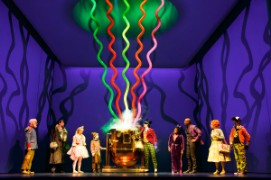 Though a favorite target of New York critics, I actually liked most of Mark Thompson’s sometimes dark and whimsical, sometimes garishly flashy scenic (and costume) designs , though something isn’t quite right on Broadway when a major production number (Act Two’s “Vidiots”) consists almost entirely of prerecorded projections, even if they are Jeff Sugg’s spectacular creations.
Though a favorite target of New York critics, I actually liked most of Mark Thompson’s sometimes dark and whimsical, sometimes garishly flashy scenic (and costume) designs , though something isn’t quite right on Broadway when a major production number (Act Two’s “Vidiots”) consists almost entirely of prerecorded projections, even if they are Jeff Sugg’s spectacular creations.
 Musical director Charlie Alterman conducts the production’s topnotch pit orchestra. Matt Lenz is associate director. Andrew Bacigalupo is production stage manager and Michael Camp is company manager.
Musical director Charlie Alterman conducts the production’s topnotch pit orchestra. Matt Lenz is associate director. Andrew Bacigalupo is production stage manager and Michael Camp is company manager.
Collin Jeffery and Rueby Wood alternate with Boshart as Charlie.
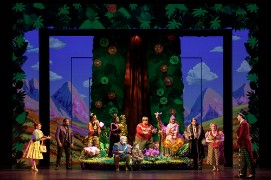 Elijah Dillehay, Sabrina Harper, assistant dance captain Kevin Nietzel, dance captain/associate choreographer, and Armando Yearwood Jr. are swings.
Elijah Dillehay, Sabrina Harper, assistant dance captain Kevin Nietzel, dance captain/associate choreographer, and Armando Yearwood Jr. are swings.
Charlie And The Chocolate Factory commits its biggest sin in giving audiences no one but Charlie to root for in a cast of characters virtually devoid of redeeming characteristics. The same can be said for this charmless musical misfire.
Segerstrom Center For The Arts, 600 Town Center Drive, Costa Mesa.
www.scfta.org
–Steven Stanley
May 28, 2019
Photos: Joan Marcus
Tags: David Grieg, Marc Shaiman, Orange County Theater Review, Roald Dahl, Scott Wittman, Segerstrom Center For The Arts



 Since 2007, Steven Stanley's StageSceneLA.com has spotlighted the best in Southern California theater via reviews, interviews, and its annual StageSceneLA Scenies.
Since 2007, Steven Stanley's StageSceneLA.com has spotlighted the best in Southern California theater via reviews, interviews, and its annual StageSceneLA Scenies.







 COPYRIGHT 2025 STEVEN STANLEY :: DESIGN BY
COPYRIGHT 2025 STEVEN STANLEY :: DESIGN BY